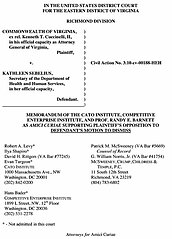Learn more about Cato’s Amicus Briefs Program.
Virginia’s attorney general filed a lawsuit in federal court challenging the constitutionality of President Obama’s health care overhaul, the Patient Protection and Affordable Care Act. Virginia’s complaint alleges, in relevant part, that the PPACA’s requirement that every individual purchase health insurance or pay a fine—the “individual mandate”—is unconstitutional because Congress lacks the power to enact it. The Government filed a motion to dismiss, claiming that Virginia lacked standing to bring this suit but also that the Commerce Clause, the Necessary and Proper Clause, and Congress’ taxing power all justify the individual mandate. Virginia responded, in relevant part, that the Commerce Clause does not grant Congress unbridled authority to regulate inactivity and force every man, woman, and child to enter the marketplace or face a civil penalty. Cato, joined by the Competitive Enterprise Institute and Georgetown law professor (and Cato senior fellow) Randy Barnett, filed a memorandum in the district court supporting Virginia’s position and explaining that neither of the Government’s fallback positions legitimizes the individual mandate either. We point out that the Necessary and Proper Clause is not an independent source of congressional power, but enables Congress to exercise its enumerated powers. Similarly, the taxing power does not authorize the individual mandate because the non-compliance penalty is a civil fine—and it would be unconstitutional even if it were a tax because it is neither apportioned (if a direct tax) nor uniform (if an excise tax). Moreover, Congress cannot use the taxing power as a backdoor means of regulating an activity unless such regulation is authorized elsewhere in the Constitution.

This work is licensed under a Creative Commons Attribution-NonCommercial-ShareAlike 4.0 International License.





